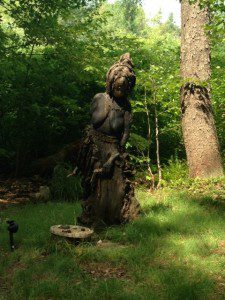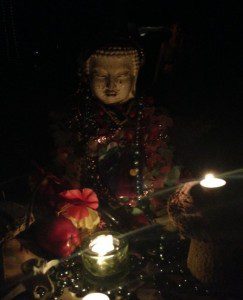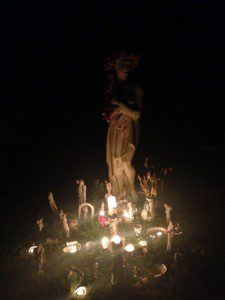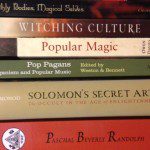 I will always love Pagan Festivals, even if I don’t write about them as much as I used to. I write to be read, and my summaries of those events never seem to attract much of an audience. After returning from Sirius Rising and Summerfest at the Brushwood Folklore Center this year I did end up putting together an article about the experience, and then never bothered to post it. If something is not going to attract an audience I don’t see much of a reason to share it.
I will always love Pagan Festivals, even if I don’t write about them as much as I used to. I write to be read, and my summaries of those events never seem to attract much of an audience. After returning from Sirius Rising and Summerfest at the Brushwood Folklore Center this year I did end up putting together an article about the experience, and then never bothered to post it. If something is not going to attract an audience I don’t see much of a reason to share it.
Even though my post about this summer’s wanderings didn’t make the website, I still feel that Pagan Festivals (and other types of gatherings) have legitimate value. This point was driven home when I came across these words from Teo Bishop on The Wild Hunt:
To know the Pagan community primarily through the internet is to miss out on a great deal of nuance and subtlety. Our digital text lacks the contours of our faces, the undertones of fragrance and sound that are present when we gather in the flesh. Pagans make interesting noises. We say things that make your head cock a little to the side. We have a way of combining sacred symbolism with the sardonic that can infuriate the pious and delight the irreverent. We are a fascinating mixture of the holy and the profane, sometimes flipping either definition on its head. And I love that about us.
This all only became clear by being at a festival for a full seven days. Immersion is the best way to learn a new language, and immersive Paganism is no different. Share a meal with someone from a different tradition and you’ll come to know the myriad of ways that you mirror one another. Pass a horn in person to someone who, online, you regularly disagree with and you just might begin forging a real and meaningful friendship in spite of your differences. I didn’t realize this before, but most of my interactions with Pagans have been lacking the very embodiment that so many of our theologies hold dear.
 I don’t think I’ve read two more insightful paragraphs all year. Not only did Teo sum up the beauty and power of the Pagan Festival experience in just a few words, but he also summed up why the Pagan Blogosphere can often be toxic, ridiculous, and heartbreaking. The next to last sentence in those two paragraphs really says it all: “Pass a horn in person to someone who, online, you regularly disagree with and you just might begin forging a real and meaningful friendship in spite of your differences.”
I don’t think I’ve read two more insightful paragraphs all year. Not only did Teo sum up the beauty and power of the Pagan Festival experience in just a few words, but he also summed up why the Pagan Blogosphere can often be toxic, ridiculous, and heartbreaking. The next to last sentence in those two paragraphs really says it all: “Pass a horn in person to someone who, online, you regularly disagree with and you just might begin forging a real and meaningful friendship in spite of your differences.”
I’m well aware that not every difference we have in Pagandom can be solved with a bottle of mead and a box of Cheez-Its, but something powerful happens when we break bread together hand to hand and face to face. I have made a lot of wonderful friends online, but there are limitations that come with this particular medium. The internet does lack nuance and subtly and it doesn’t handle well-intentioned sarcasm well. You can use all the emoticons you want, but nothing beats the sound of laughter. Teo is absolutely right; for a spirituality built upon doing we sometimes forget to do with others.
 I’m certainly guilty of this. It’s easy enough to simply retreat into the ritual room and simply practice Paganism with only my wife or immediate circle. I’m a Witch, I practice Wicca, but I also think of myself as a part of something bigger; I’m a Modern Pagan and I share that belief in Paganism with a far wider group of people than those who simply meet at my house for the full moon. If I didn’t want to be challenged I wouldn’t have stepped onto this path. I like pushing my boundaries, examining my beliefs, and sharing my experiences with others, and that type of thing is always best done face to face. Maybe that’s my biggest take away from the festival experience; the reminder that there are many ways to do and be Pagan and that my own experience is simply one Pagan Path among many.
I’m certainly guilty of this. It’s easy enough to simply retreat into the ritual room and simply practice Paganism with only my wife or immediate circle. I’m a Witch, I practice Wicca, but I also think of myself as a part of something bigger; I’m a Modern Pagan and I share that belief in Paganism with a far wider group of people than those who simply meet at my house for the full moon. If I didn’t want to be challenged I wouldn’t have stepped onto this path. I like pushing my boundaries, examining my beliefs, and sharing my experiences with others, and that type of thing is always best done face to face. Maybe that’s my biggest take away from the festival experience; the reminder that there are many ways to do and be Pagan and that my own experience is simply one Pagan Path among many.
One of the things that stands out about my festival experience this summer is just how many different types of Pagans I interacted with. One evening during my wanderings I shared cider (and absinthe) with a Voodoo Priestess, an atheist Pagan, a Heathen, some Dianic Witches, several BTW initiates, and a couple of Druids. In all of those instances there were areas of common ground and shared experience. We certainly didn’t all think alike or believe in the same things, but it was obvious that we were all a part of larger community. The ecstasy of Dionysus is similar to the power of the loa, and truth can be found on the wind whether you are a polytheist or an atheist.
It’s so much easier to understand other Pagans when you actually spend time with other Pagans. I’m not sure that “full immersion” is the only way to accomplish this, but I do know that it can’t be accomplished simply through blogs and comments. To truly understand someone I need to have a conversation with them, and not just a series of bullet-point arguments. It has to involve give and take, and it has to involve letting go of the assumptions we sometimes have about other people and their faith practices.
 I sometimes get laughed at when I suggest we all play in the same sandbox, and that’s fine. I’d be lying if I said the barbs don’t occasionally hurt, but if you are going to write for thousands of Pagans it’s to be expected. What tends to bother me the most about some of those criticisms is that they feel like arm-chair judgements. If you think that Pagandom has more differences than similarities what are you basing that opinion on? Does it come from true interaction with others or does it come from a series of blog posts you happen to disagree with?
I sometimes get laughed at when I suggest we all play in the same sandbox, and that’s fine. I’d be lying if I said the barbs don’t occasionally hurt, but if you are going to write for thousands of Pagans it’s to be expected. What tends to bother me the most about some of those criticisms is that they feel like arm-chair judgements. If you think that Pagandom has more differences than similarities what are you basing that opinion on? Does it come from true interaction with others or does it come from a series of blog posts you happen to disagree with?
Our judgements should be based on doing instead of simply reading. I used books to learn about Witchcraft and the gods. I experienced the gods and the Craft by doing. The diverse opinions and practices of Modern Paganism are also things that can’t simply be read about, they have to be seen and heard to truly be understood. I’m not saying that everyone needs to go to a Pagan Festival or attend a local Pagan Pride Day only that you might be surprised at how easily our differences fall away when conversations, opinions, and experiences are shared face to face.

















